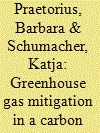| Srl | Item |
| 1 |
ID:
094910


|
|
|
|
|
| Publication |
2010.
|
| Summary/Abstract |
This study applies a socio-technical systems perspective to explore innovation dynamics of two emerging energy technologies with potential to reduce greenhouse gas emissions from electrical power generation in the United States: carbon capture and storage (CCS) and enhanced geothermal systems (EGS). The goal of the study is to inform sustainability science theory and energy policy deliberations by examining how social and political dynamics are shaping the struggle for resources by these two emerging, not-yet-widely commercializable socio-technical systems. This characterization of socio-technical dynamics of CCS and EGS innovation includes examining the perceived technical, environmental, and financial risks and benefits of each system, as well as the discourses and actor networks through which the competition for resources - particularly public resources - is being waged.
|
|
|
|
|
|
|
|
|
|
|
|
|
|
|
|
| 2 |
ID:
092733


|
|
|
|
|
| Publication |
2009.
|
| Summary/Abstract |
Carbon capture and storage (CCS) promises to allow for low-emissions fossil-fuel-based power generation. The technology is under development; a number of technological, economic, environmental and safety issues remain to be solved. CCS may prolong the prevailing coal-to-electricity regime and countervail efforts in other mitigation categories. Given the need to continue using fossil-fuels for some time, however, it may also serve as a bridging technology towards a renewable energy future. In this paper, we analyze the structural characteristics of the CCS innovation system and perform an energy-environment-economic analysis of the potential contribution of CCS, using a general equilibrium model for Germany. We show that a given climate target can be achieved at lower marginal costs when the option of CCS is included into the mix of mitigation options. We conclude that, given an appropriate legal and policy framework, CCS, energy efficiency and some other mitigation efforts are complementary measures and should form part of a broad mix of measures required for a successful CO2 mitigation strategy.
|
|
|
|
|
|
|
|
|
|
|
|
|
|
|
|